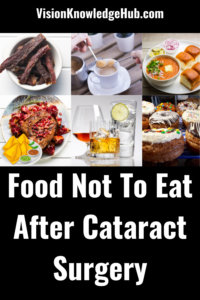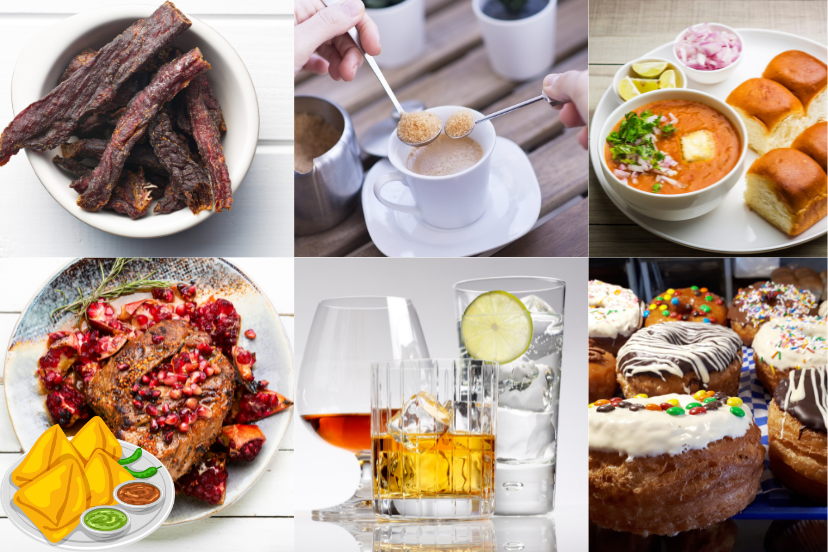Food Not To Eat After Cataract Surgery
Discover essential dietary guidelines for post-surgery recovery! Uncover which food not to eat after cataract surgery and boost your healing. Our in-depth guide explains dietary do’s and don’ts to keep your eyes healthy and speed up your recovery. Cataract surgery is a life-changing procedure that can significantly improve your vision. However, the success of the surgery and the speed of your recovery depend on various factors, including your diet. While there are many foods that can aid in the healing process, there are also some that should be avoided. In this article, I’ll share my insights as a researcher and advisor on vision health, providing helpful suggestions and reasons for avoiding certain foods after cataract surgery.
Introduction To Food Not To Eat After Cataract Surgery
Navigating your diet after cataract surgery is crucial for a smooth recovery. While you might be eager to indulge in your favorite foods, some options could impede your healing process. This guide will walk you through the foods to avoid post-surgery, shedding light on the reasons behind these dietary restrictions. Let’s dive in to ensure your recovery is as quick and comfortable as possible.
General Dietary Guidelines After Cataract Surgery
Focus on antioxidant-rich foods, lean proteins, and whole grains after cataract surgery. Avoid high-sugar, salty, and fatty foods. Stay hydrated with water and limit caffeine and alcohol. Consult your doctor for personalized advice.
What To Prioritize
You’ll want to focus on foods rich in antioxidants, fiber, and protein. These will help in quicker healing.
What To Avoid
On the flip side, certain foods can hinder your recovery, and that’s exactly what we’ll be diving into today.
High-Sodium Foods
High-sodium foods can lead to increased fluid retention, which may elevate your blood pressure. This can be detrimental to the healing process and potentially affect the outcome of your surgery.
Spicy Foods
Spicy foods can irritate the digestive system, leading to discomfort and potentially straining the eyes. It’s best to avoid foods that could cause unnecessary discomfort during your recovery.
Processed And Fried Foods
Processed and fried foods are often high in unhealthy fats, which can lead to inflammation. Inflammation can slow down the healing process and increase the risk of complications.
Sugary Snacks And Beverages
Sugary snacks and beverages can cause rapid blood sugar spikes and crashes. Fluctuations in blood sugar levels can negatively impact your overall health and potentially affect your eye’s healing process.
Alcohol
Alcohol can dehydrate your body, and proper hydration is crucial for healing. Dehydration can also lead to dry eyes, which can be particularly uncomfortable after cataract surgery.
Caffeinated Drinks
Caffeine is known to increase blood pressure and potentially cause restlessness. Both of these effects can be counterproductive during the recovery phase.
Very Hot Or Very Cold Foods
Extreme temperatures can lead to discomfort and may irritate your eyes. It’s best to stick to foods and beverages that are closer to room temperature during your recovery.
Citrus Fruits And Juices
Citrus fruits and juices are acidic and can be irritating to the stomach. It’s advisable to avoid them to prevent any digestive discomfort during your healing process.
Foods High In Vitamin K
Vitamin K plays a role in blood clotting, and consuming foods high in this vitamin may interfere with the healing process. While it’s essential for overall health, it’s best to consume these foods in moderation during your recovery.
Excessive Dairy
Dairy products can be heavy on the stomach and may cause digestive issues. It’s wise to limit your consumption of dairy immediately after surgery.
High-Fiber Foods
High-fiber foods can be difficult to digest, and they may lead to gas or bloating. It’s essential to maintain digestive comfort during your recovery.
Spicy Condiments
Even if you avoid spicy foods, be cautious with condiments like hot sauce and spicy mustard, as they can still irritate your digestive system.
Nuts And Seeds
These foods can be challenging to chew and may get stuck in your teeth, increasing the risk of infection. Opt for nut butters or finely ground nuts if you crave their nutritional benefits.
Tough Meats
Tough meats require extensive chewing, which can strain your jaw and potentially lead to discomfort. Choose tender, easily digestible meats instead.
Excessive Caffeine
In addition to avoiding caffeinated drinks, be mindful of foods like chocolate, which also contain caffeine. Excessive caffeine can disrupt your sleep and hinder the healing process.
Foods That May Interact With Medications
Be cautious with foods that can interact with post-surgery medications. For instance, grapefruit can interfere with certain drugs, altering their effectiveness. Some leafy greens, rich in Vitamin K, might counteract blood thinners. Foods containing tyramine, like aged cheese, can clash with some antidepressants. Always read medication labels for potential food interactions and consult your healthcare provider for tailored advice. Being vigilant about food and medication compatibility aids a smoother recovery after cataract surgery.
Special Dietary Considerations
If you follow a special diet like veganism, vegetarianism, or a gluten-free regimen, tailor your post-cataract surgery meals accordingly. For vegans and vegetarians, sources of plant-based protein like lentils and tofu can replace animal proteins. If you’re gluten-free, opt for grains like quinoa and rice over traditional wheat-based options. In any case, focus on foods rich in antioxidants and fiber, and avoid processed items high in sugar or salt. Always consult your healthcare provider for a personalized diet plan that complements your lifestyle and accelerates your healing process.
Best Food To Eat After Cataract Surgery
After cataract surgery, the best foods to eat are those rich in antioxidants, vitamins, and protein. Incorporate leafy greens like spinach and kale, which are high in essential nutrients like Vitamin C, to boost your immune system. Fruits like blueberries and oranges provide antioxidants that help with inflammation reduction. Lean proteins such as grilled chicken or fish aid muscle recovery and tissue repair. Opt for whole grains like brown rice and quinoa over processed carbs to maintain stable blood sugar levels. Hydration also plays a critical role in recovery, so sip on water, herbal teas, or natural fruit juices throughout the day. Always consult your healthcare provider for personalized dietary advice tailored to your medical history and medication regimen.
Should You Drink A Lot Of Water After Cataract Surgery?
Staying hydrated after cataract surgery is essential. Water helps flush toxins from your body and aids in quicker healing. It also keeps your eyes moist, which is crucial for post-surgery comfort and recovery. Aim for at least eight 8-ounce glasses of water daily unless your doctor advises a different amount. Limit beverages that dehydrate you, like caffeine and alcohol, to ensure optimal hydration and a smoother recovery.
When To Consult A Medical Professional
Consult a medical professional immediately if you experience symptoms like severe eye pain, vision loss, or increasing redness after cataract surgery. Also, reach out if you have concerns about food and medication interactions that could affect your recovery. Don’t hesitate to seek advice for persistent digestive issues or nutritional deficiencies. Prompt medical guidance can help address complications early, ensuring a smoother and faster recovery process.
Food Not To Eat After Cataract Surgery – Conclusion
Your diet plays a crucial role in the success of your cataract surgery and your overall eye health. While it’s essential to avoid certain foods that can hinder the healing process, you should also focus on a diet rich in fruits, vegetables, lean proteins, and plenty of water to support your recovery.
The road to recovery post-cataract surgery can be smooth, provided you take the right dietary steps. Make wise choices and consult your doctor as needed.
Please note that this article should not replace professional medical advice. Consult a healthcare professional for an accurate diagnosis and tailored treatment plan.
Frequently Asked Questions (FAQs)
Can I drink herbal tea after cataract surgery?
Herbal teas are generally a safe option after cataract surgery, but it’s best to choose non-caffeinated varieties and avoid any that might contain herbs that could interact with your medications. Always consult with your doctor for personalized advice.
How long should I avoid these foods after cataract surgery?
Generally, you should avoid problematic foods like those high in sugar, salt, and fats for at least two weeks after cataract surgery. However, the exact time can vary. Consult your healthcare provider for personalized recommendations tailored to your recovery.
Can I eat raw vegetables and fruits after cataract surgery?
While raw vegetables and fruits are nutritious, they can be challenging to digest immediately after surgery. Consider steaming or cooking vegetables and opting for soft, ripe fruits to make them easier on your digestive system.
Is it okay to have dairy alternatives like almond milk?
Dairy alternatives like almond milk are usually a better choice than regular dairy immediately after cataract surgery, as they are generally lighter on the stomach and less likely to cause discomfort. However, check for added sugars or preservatives and consult your healthcare provider for personalized dietary advice.
Can I have ice cream after cataract surgery?
You can have ice cream after cataract surgery, but moderation is key. Opt for low-sugar and low-fat varieties to avoid inflammation that can slow down healing. If you’re on specific medications, consult your doctor to avoid any adverse interactions.
Can I eat chocolate?
You can eat chocolate in moderation, but opt for dark chocolate with higher cocoa content for its antioxidants. Be cautious if you’re on medications that may interact with caffeine or sugar. Consult your healthcare provider for personalized advice.
Extra FAQs Related To Food Not To Eat After Cataract Surgery
What food not to eat after cataract surgery?
Avoid foods high in sugar, salt, and saturated fats after cataract surgery. Spicy foods and alcohol can also hinder recovery. Be cautious with foods that may interact with post-surgery medications, and always consult your healthcare provider for personalized advice.
Can I drink milk after cataract surgery?
You can drink milk after cataract surgery for its calcium and protein benefits. However, consult your doctor if you’re lactose intolerant or taking medications that interact with dairy. Opt for low-fat or skim options to minimize saturated fats.
What is the best fruit for cataract surgery?
The best fruits after cataract surgery are those rich in antioxidants like blueberries, oranges, and kiwis. They help reduce inflammation and support eye health. Always consult your healthcare provider for personalized recommendations tailored to your nutritional needs and medication regimen.
Can we eat banana after an eye operation?
Yes, you can eat bananas after an eye operation. They provide essential nutrients like potassium and Vitamin C, which aid in recovery. However, always consult your healthcare provider for personalized dietary advice, especially if you’re on specific medications.
What should you avoid after eye surgery?
Avoid strenuous activities, bright lights, and rubbing your eyes. Stay away from dusty environments and swimming pools to minimize infection risk. Skip alcohol and limit caffeine, as they can interfere with healing. Consult your doctor for specific guidelines.





